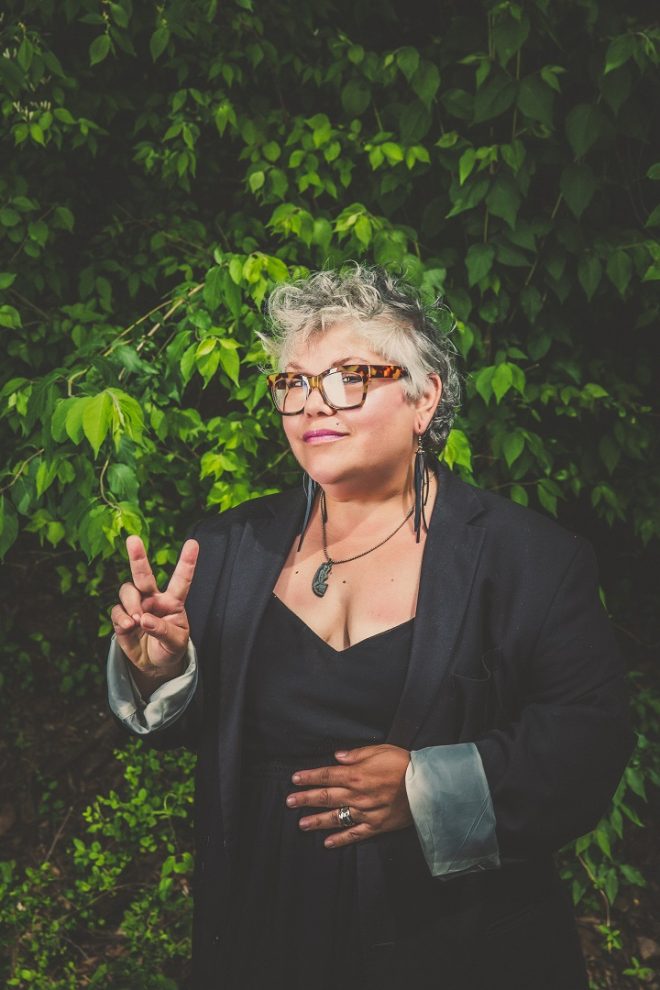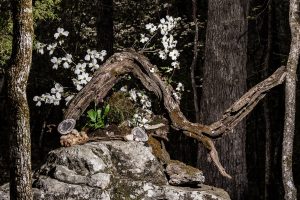GETTING THE GREEN LIGHT: How plant medicine enhances one local artist’s art, in her writing, as a patient, and as an educator

WORDS / YANI KO
PHOTO / KAT WILSON
Wendy Love Edge pauses thoughtfully, frequently when telling her story, combing through the details of the many lives she’s lived before. She Irish step-danced in front of a bagpipe band up and down the East coast as a teenager. She worked as an occupational therapist for 25 years after graduating from Boston University. She was a spiritual healer at a small shop she owned with her ex-partner. She was once married to a man.
Today, Edge, 54, is an advocate for medical cannabis and plant medicine in Arkansas and serves as the director of Bulldozer Health Inc., a nonprofit organization Edge founded in 2014. Bulldozer Health is dedicated to educating the public about healthcare options and providing access to alternative healthcare.
It was while studying to become an occupational therapist at Boston University that Edge observed what she believed to be a troubling connection between the pharmaceutical industry and the medical community.
“They added business courses in my junior year that they never had before and I didn’t realize the implications until later,” Edge says.
In 2011, more than 20 years into her career as a therapist and area director of a rehabilitation company, Edge was diagnosed with dermatomyositis, an inflammatory disease characterized by progressive muscle weakness and a painful recurring rash. For Edge, the symptoms were severe and debilitating, leading to limited mobility of her limbs and restricting her to a motorized wheelchair.
“They told my wife and I that I would die from either the disease or the treatment,” Edge says, explaining that she was already on pharmaceutical drugs for a heart condition, arthritis and cholesterol. In addition to those medications, Edge was prescribed a cocktail of 16 different pharmaceutical drugs ranging from steroids to antidepressants. The list also included opioids for pain.
“I believed them when they told me I would die, and that was the main problem, because I just wanted to do whatever they said—‘they’ meaning the medical establishment,” Edge says.
She remained on the endless list of drugs, seeing little progress and experiencing various negative side effects. Then, after a meditation session one afternoon in 2013, Edge made a life-altering decision.
“I decided that I would wean off as many drugs as I could so I could see what my body could do,” Edge says, adding that she did not realize she was addicted to her prescribed opioids and antidepressants. “I went into full withdrawal, shaking and sweating and really having a difficult time coping.
“I had read that when they give you more than two drugs they don’t really know what happens with interactions so on 16 how could they possibly know what’s going on?
“I had asked my doctor, ‘What can I come off of?’ and he said, ‘You can’t come off of anything because you have a diagnosis to go with every drug.’ I didn’t want to ask him about it. So, here I am in withdrawal and I’m thinking ‘Well, I can’t go to the doctor.”
It was an ordinary afternoon in 2013 at her home in Worcester, Massachusetts, when she called a friend to ask for assistance in getting groceries. Edge and her wife, Angela, her primary care taker, had recently taken time apart to manage personal issues. The friend was unavailable that day so she sent a mutual acquaintance, Donna, to help with the task. It was Donna that turned that ordinary afternoon into one that Edge would never forget.
“She asked me a question that really saved my life,” Edge says. “She asked me if I had tried cannabis. I was like, ‘Why are you asking me this. I’m trying to come off of drugs. I don’t know what you’re talking about.’”
While Edge had experimented with cannabis in high school, she admitted she did not understand that it had medicinal effects at that time. Donna convinced her to try it as a treatment for her many ailments.
“With just a few puffs the withdrawal symptoms went away and the pain was almost down to nothing,” Edge says. “I knew it was my medicine as I took it in. I could feel it.”
Edge has since cut her pharmaceutical drugs down to only two prescriptions and credits this to living a generally healthier lifestyle, eating nutritious foods, exercising and regularly using cannabis as medicine.
“I went back to the doctor after I came off of 10 drugs and had lost about 25 pounds and made all these other health changes,” says Edge. “And this was the thing that really irked me. He was very positive, but this is what he said: ‘I wanted to tell you to stop taking some of those drugs but I couldn’t because I could lose my license.’ That’s how much big pharma is selling. It’s backwards. Big pharma is in control of our doctors. It’s not the other way around,” she says.
“I made a decision that I can’t recommend to other people,” Edge explains. “I never tell anybody not to take prescribed medications, but I will tell them to look every single one of them up and look at the side effects, look at interactions and ask your doctor to talk to you about it.”
Arkansas passed Initiative 6 in 2016, which legalized marijuana for medical use. Doctors can write recommendations for patients with one of 19 qualifying conditions including cancer, glaucoma, arthritis and PTSD.
Dr. Tammy Tucker of Dr. Tammy’s Healing Art Centers in Bentonville said that she writes many of her recommendations for qualifying patients who want an alternative to opioids.
“They’ve done numerous studies that show [medical cannabis] is a gateway out of opioids and I see that all the time with my patients that are trying to get off medications,” Dr. Tucker says. “What happens with cannabis is the same amount works all the time. You don’t have to keep increasing the amount, unlike opioids. [Patients] constantly have to keep increasing the amounts to get the same effects because the opioid receptors get saturated.”
Edge works with doctors to help provide free or lower-cost visits for cannabis recommendations through Bulldozer Health, which is active in Arkansas, Massachusetts, Rhode Island and Connecticut. She recently organized a music and art festival, The Green Heart Festival, themed around wellness and plant medicine, held at the Trailside Village in Fayetteville.
Edge has told her story all over the country as well as authoring a book about her experiences in coming off of pharmaceutical drugs. She hosts a weekly radio show, The Wendy Love Edge Show with Topher Kogen, that airs on KPSQ.
“We talk openly about our personal health journeys, interview various health and wellness professionals, local musicians, and [cover] news concerning cannabis legislation,” says Topher Kogen, Edge’s co-host.“This is a very important issue for me. As someone with various family members with arthritis and other health concerns I am in constant confusion on why this plant and its users are demonized on a systematic level.”
“The opinions expressed on this show are not necessarily those of this station. Please check with a trusted health adviser before following any medical advice,” reads the opening disclaimer to The Wendy Love Edge Show with Topher Kogen. Hypnotic beats stream quietly before Edge’s soothing yet lively voice chimes in to introduce her upcoming guests. You can almost hear her silvery curls bouncing as she laughs between banter with Kogen.
The ceilings and pipes in the tiny studio on the Fayetteville square are soundproofed and adorned with sparkling red and purple tapestries, bringing color to the otherwise grey space. Edge and Kogen sit in front of microphones at a wooden desk that takes up most of the room. Soon the cramped studio is filled to the brim as The Trashcan Bandits, a genre-bending quartet join, clarinets and mandolins in tow, to perform songs for the first segment of the show.
Edge finds it important to include musical acts in her lineup of guests.
“In the human spirit, I really feel like music, art, wellness and care for the environment all come from the same place,” Edge says.
Edge herself is a mixed-media artist and painter, and her wife is a musician. She also danced jazz and tap and taught en pointe until the birth of her first son.
Edge is active in the Cannabis Art Guild, a collective of international artists who use the cannabis plant as art material, including hemp canvases and hemp seed oil paints.
“I started doing these ‘spirit paintings,’” Edge says, “I put a background on [the canvas] and I put these blobs of paint and I drag a knife through it. When I would drag a knife through it these figures would start appearing. It’s kind of an intuitive painting,” she says.
During her training to become an occupational therapist, Edge took multiple art classes including pottery, painting and macrame.
“We had to learn how to do those things and also what it takes physically, emotionally, and cognitively to do those kinds of projects,” she explains.“That’s one thing I loved about being a therapist, being able to combine these things and learning that the human spirit really engages and soars when you’re doing something that you love and creating something,.”
Edge often found that patients would progress more quickly in their therapy when given art tasks over physical exercises.
“Art is a beautiful example of something that can help with the healing process, whether or not you have any talent—it doesn’t matter,” Edge says. “It puts your headspace in a different place so then you can maybe deal with some of your problems more effectively. I think it definitely is a bridge for healing.”
Edge’s cannabis activism is present in many areas of her life—in her art, in her writing, as a patient and as an educator. Her goals for Bulldozer Health in the next year include finding a physical location to sublet to health providers and space to hold classes. She also wants to focus on adding a branch of psychological care to the platform for survivors of sexual abuse.
“If they can’t afford these services then we’ll be able to help them access them,” Edge says, “I’d love to have our own studio too to do our shows so that’s what I’m manifesting now.”
—
A previous version of this article listed Boston as Edge’s home. Although she is originally from there, her house is in Worcester, Massachusetts. Sheila was originally listed as the friend who assisted with cannabis medicine. Edge owned the spiritual shop with her ex-partner, not ex-wife. The article has been corrected to reflect these changes.





Comments